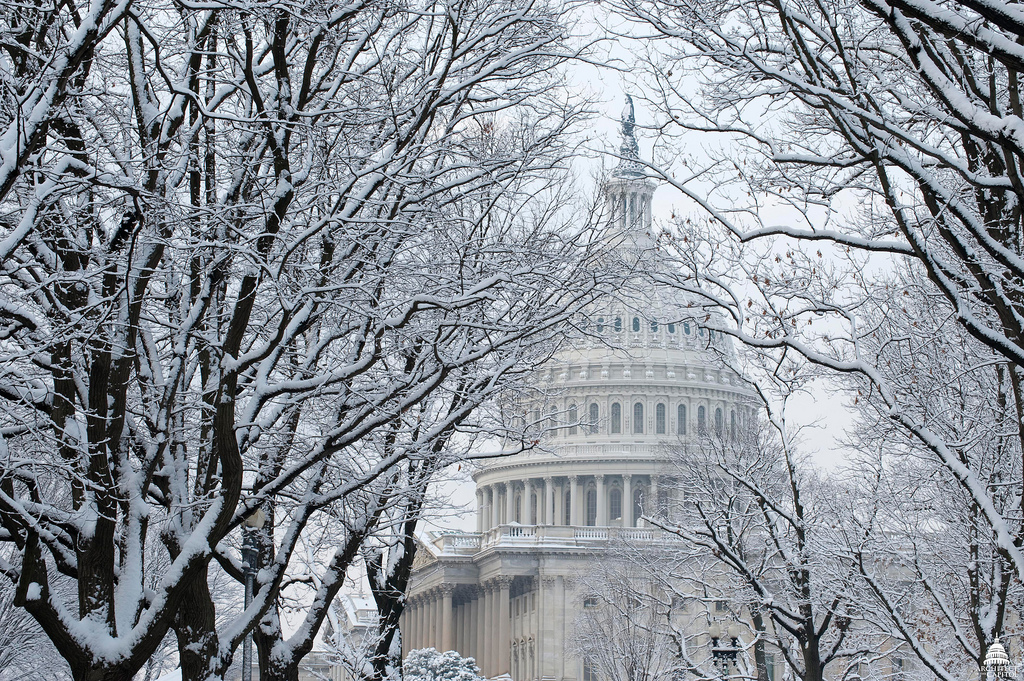Last night, House and Senate Appropriators unveiled a $1.1 trillion spending package that is a combination of all but one of the Fiscal Year 2015 (FY15) appropriations bills rolled into an omnibus for the remainder for FY15, plus a continuing resolution (CR) funding the Department of Homeland Security through February 2015. The FY15 appropriations package, dubbed the “Cromnibus,” would provide new funding for all government agencies and programs, except the Department of Homeland Security, and is designed to gain bipartisan support and avert both a government shut down or another continuing resolution, as was seen in FY 2014. The current CR runs through tomorrow (December 11, 2014).
The deal is a victory for appropriators, who have insisted that spending caps set under the 2013 budget agreement would allow them to move most of the annual measures for FY15. The Homeland Security stopgap portion is an effort by Republicans leaders to force a showdown with the White House on immigration in the new Congress, when Republicans will control both chambers of Congress.
The Cromnibus will move as HR 83, a previously considered piece of energy legislation. By using a previously considered bill, House and Senate leadership is trying to overcome Senate procedural hurdles so that measure could be cleared as early as Friday. Regardless, with the current stopgap funding expiring on tomorrow, the House will likely pass a two- or three-day CR to guarantee there is no shutdown before the Senate takes action and sends the “cromnibus” to the President.
For domestic agencies, flat funding is the norm, with some spending tradeoffs made to build political support. For example, the bill’s education programs are almost level funded at $70.5 billion, only $100 million less than last year. Democrats, however, will be pleased with level funding of $8.5 billion for Head Start and $22.5 billion for Pell grants, an amount that would raise the maximum grant award by $100 to $5,830.
Overall, Appropriators said the entire Labor-HHS-Education section of the spending bill would contain $156.8 billion in discretionary money, roughly the same level enacted last year. The title is always among the most contentious of the annual spending bills because of the wide reach of the programs under its jurisdiction and has become even more of a lightning rod since passage of the health care overhaul in 2010.
Additionally, the bill would provide $100 million, a $1.6 million increase, for the Office of Civil Rights, which is responsible for investigating Title IX complaints of inappropriate campus response to sexual violence. Moreover, the Student Aid Administration received a $230 million increase from last year to $1.4 billion with part of that funding going to increased enforcement and data collection under the Clery Act. The Committee commended the Education Department for its emphasis on campus sexual assault prevention.
The Defense Department, however, would see its base budget rise $3.3 billion over current funding to $490.2 billion, an amount still $500 million less than what was requested by the Pentagon.
Of note in the Cromnibus:
- National Institutes of Health received $30.1 billion, which is $150 million more than FY14.
- National Science Foundation received $7.34 billion, which is $172.3 million above the 2014 enacted level. NSF’s MREFC received $200.8 million.
- The Department of Education was cut by $166 million overall. Pell grants, however, received a net increase for ED of $137 million increasing the maximum award to $5,830. Federal Work Study received an increase of $15 million. The Student Aid Administration received an increase of $230.924 million. Race to the Top was eliminated.
- National Aeronautics and Space Administration (NASA) received $18.01 billion for which is $363.7 million more than the 2014 enacted level.
- National Oceanic and Atmospheric Administration (NOAA) received $5.4 billion, which is $126.4 million more than the 2014 enacted level. Big winners at NOAA were Weather, which received $90.8M, which is $9.6M above the FY14 enacted level. Climate accounts remained relatively level with previous funding. Sea Grant received level funding of $62 million. NOAA Cooperative Labs and Institutes received $60 million, which is level funding. The bill provides $60 for Climate Competitive Research, Sustained Observations and Regional Information, the same as the FY14; $38M for Regional Climate Data and Information; $8.5M for Integrated Ocean Acidification, which is $1.5M above the FY14 enacted level; $41.3 for Sustained ocean observations and monitoring, which is comparable to the FY14 enacted level
- National Weather Service operations received $954.2 million for, which is $526,000 above the 2014 enacted level.
- The US Geological Survey received $5 million in additional funding Early Earthquake Warning funding on the Pacific Coast.
- The Department of Defense’s S&T programs generally enjoyed increases in funding (6.1: $2.279 billion (+$112 million over FY14); 6.2: $4.605 billion (-$38 million below FY14); 6.3: $5.530 billion ($155 million above FY14)
The House is expected to pass the measure on Thursday and send to the Senate. The Senate is expected to pass it Thursday or Friday. The President is expected to sign it into law Friday.
Federal Relations will continue to update information on the Cromnibus as it move through the Congress and becomes law.
